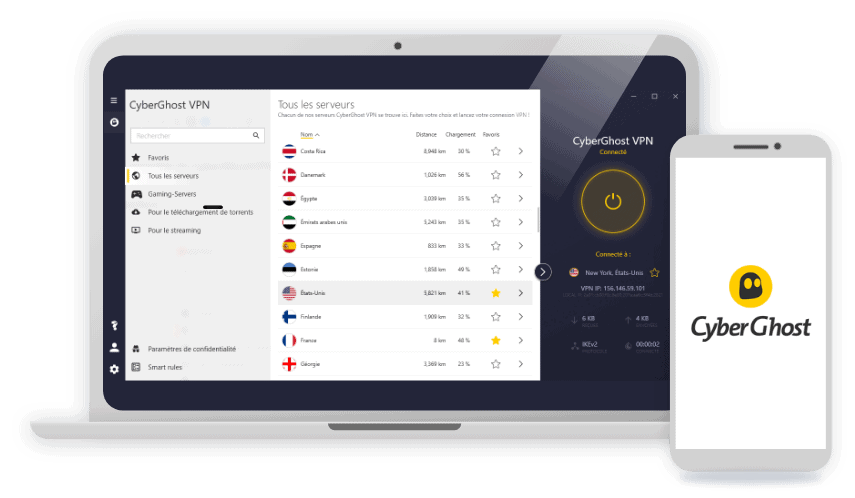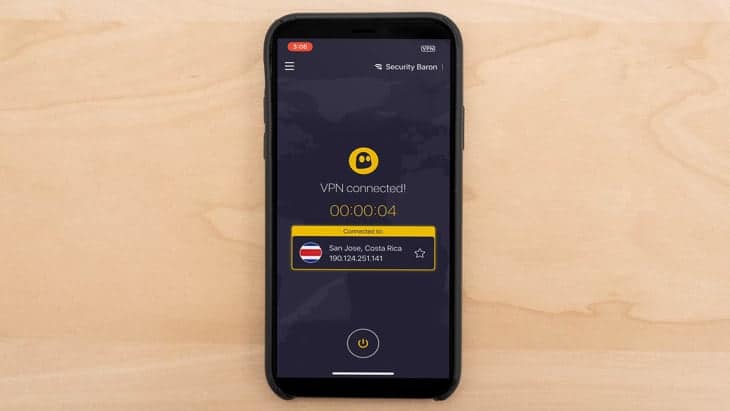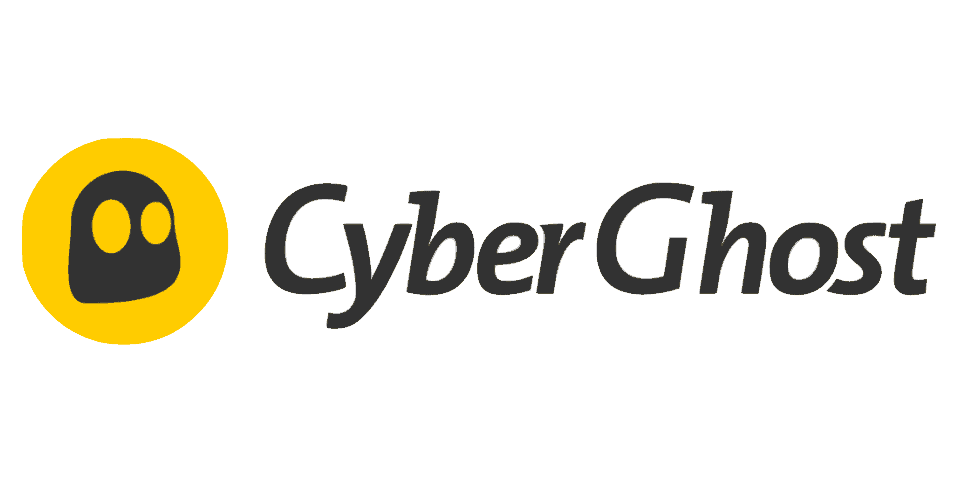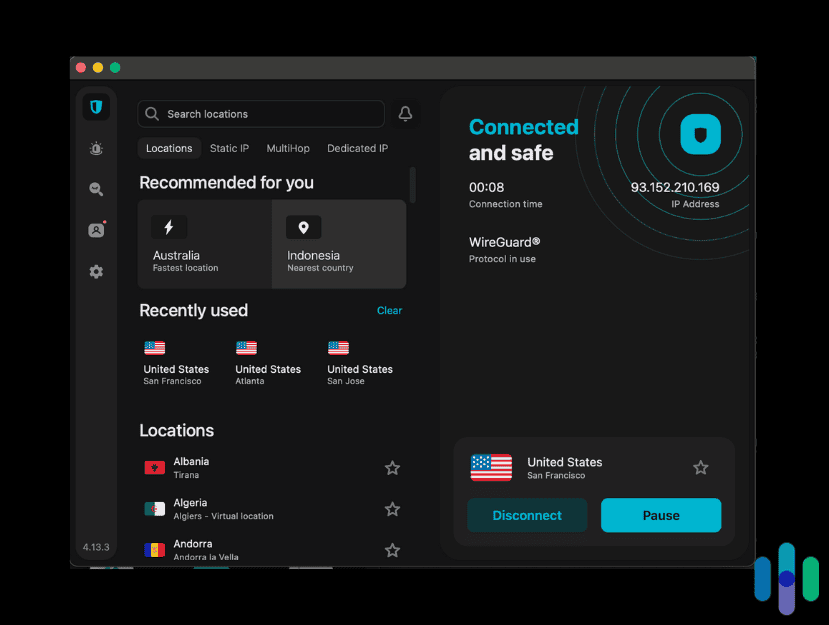
How Much Does CyberGhost Cost?
CyberGhost offers VPN subscriptions ranging from $2.19 per month to $12.99 per month.
- Servers in 100 countries
- Headquartered in Romania, outside Five Eyes, Nine Eyes, and 14 Eyes jurisdictions
- 45-day money-back guarantee.

As one of the best cheap VPNs, CyberGhost offers low-cost subscriptions with all of the key features we look for, like advanced encryption, a robust server infrastructure, and a no-logs privacy policy. But, with minimal options for bundling with other cybersecurity tools, does CyberGhost offer enough for you?
That’s the question we’re going to help you answer. We’ll cover everything that’s included with CyberGhost’s base subscription that starts at $2.19 and their options for bundling with additional tools. Let’s jump in.
CyberGhost’s Pricing vs. The Competition
First let’s set the bar. NordVPN, Surfshark, and Private Internet Access are the highest-rated VPNs on our site right now. CyberGhost is a little more affordable compared to them, but feature-wise, CyberGhost also offers less. It lacks features like multihopping, for example, so the lower price point is justified. To see how CyberGhost stacks up against one of our top picks, we recommend reading our CyberGhost vs. NordVPN comparison.
CyberGhost Subscription Options
If you’re looking for a month-to-month plan, CyberGhost’s price is on par with the average VPN cost, which is around $11.29 per month. However, like other providers, you’ll pay less per month with a longer-term subscription. Here’s a breakdown CyberGhost’s subscription costs:
| Term length | 1 Month | 6 months | 2 years + 2 months free |
|---|---|---|---|
| Monthly rate | $12.99 | $6.99 | $2.19 |
| Total amount billed | $12.99 | $41.94 | $56.94 |
Unlike Surfshark’s pricing plans with multiple tiers, CyberGhost keeps costs simple with one tier. They offer discounts for longer subscriptions with monthly, semi-annual, and biennial (two-year) plans. We recommend the two-year plan for most people as it offers by far the best rate and the 45-day money-back guarantee makes it relatively risk-free.
The six-month rate is fairly reasonable, but it’s probably best for people who only want a VPN for a specific project or timeframe. For example, if you’re a student spending a semester overseas, this short-term plan offers access to your local Internet content while you’re away. If you are only looking to try out CyberGhost or you’re all in on it, it makes more sense to go with the monthly or two-year plan, respectively, as opposed to splitting the difference with a six-month plan.
>>Check Out: Best VPNs for School in 2025
In addition to the VPN, you can opt to buy add-ons. The CyberGhost Security Suite is $1 per month or $24 over the course of two years. This Windows-only suite includes antivirus protection and a security updater, which basically scans your device’s programs and drivers and updates them if needed. We don’t recommend it because it’s not even close to the best antivirus software. Stay in your lane, CyberGhost
Pro Tip: That’s not to say there aren’t any VPNs that offer solid antivirus software. Surfshark One is both from a top-tier VPN provider and a top-rated antivirus software. See our Surfshark One review; it might be a better option than CyberGhost if you’re also looking for malware protection.
You can also add a dedicated IP address in a specific country for $2.50 per month. Rather than using an IP address that you share with other CyberGhost users, having a dedicated IP address means you get the same one every time you connect. This means, for example, you can’t get blocked by Netflix due to someone being irresponsible with a CyberGhost IP address you’re currently using.
What A CyberGhost Subscription Includes
Feature-wise, all CyberGhost plans offer the same functions and benefits. That is, they let you connect to one of CyberGhost’s 11,000 servers, encrypt your traffic, and hide your IP address. Here’s some more details of what CyberGhost has under the hood:
- Automatic kill switch
- Shared IP address for better anonymity
- Audited “no-logs” policy
- OpenVPN and WireGuard VPN protocols
- 256-bit AES (OpenVPN) and ChaCha20 (WireGuard) encryption
- Open access to streaming libraries around the world (Netflix, Hulu, Prime, etc.)
- Anonymous torrenting
- DNS, WebRTC, and IP leak protection
- 11,000 servers in 100 countries
- Seven simultaneous connections
- 24/7 live chat and email support
One of the features we believe CyberGhost should improve is the limit on simultaneous connections. While you can install the CyberGhost app on as many devices as you want, you can only connect up to seven devices at a time. That’s enough for most users, but when we tested CyberGhost, we weren’t satisfied with the connection limit. We like to keep all our devices connected to a VPN, and we have more than seven devices. If you’re like us, take a look at our Surfshark review. It offers unlimited simultaneous connections.
Pro Tip: Just bought a shiny new iPhone? Protect any new device with a VPN for a safer and more private experience. With CyberGhost, you can use one subscription on up to seven devices simultaneously, but you can actually download and install it on more devices.
Referral Program
The CyberGhost referral program is one of the few ways you can defray the cost of your subscription. When you sign up for the program, you get a referral link that you can send to people you know. If someone buys a CyberGhost subscription through that link, both you and the new user get 30 days of free access. It’s a great way for you to get a free VPN for an additional 30 days.
To take advantage of the referral program, you need to be an active subscriber. You are also limited to three referrals, which means you can only get a maximum of 90 days of free CyberGhost.
Payment Options
We had a wide variety of options to pay for CyberGhost, including Visa, Mastercard, American Express, PayPal, and Bitcoin. Personally, we used a credit card, but if you want a more secure and anonymous payment method, we recommend either PayPal or crypto.
The former lets you pay for the service without giving CyberGhost and its payment partner – Cleverbridge or Stripe, depending on where you live – your card details. PayPal is a safe payment service that can reduce the exposure of your payment information.
Cryptocurrency offers the most private and secure payment option. If you are very concerned about your identity being revealed to the authorities by CyberGhost, you should pay for your subscription with crypto.
Did You Know: Bitcoin is not fully anonymous because transactions are tied to your Bitcoin wallet.1 That means transactions you make with your Bitcoin wallet can be traced back to you if there are any links connecting your real identity to your Bitcoin wallet.
Is There a Free-Trial Period or Money-Back Guarantee?
There’s always risk in buying virtual products. What if you end up not liking it? What if it underdelivers? What if a better option comes along?
With CyberGhost, you have a couple of options. You can either enjoy a few days of free trial or cover your purchase with a money-back guarantee.
With the first option, you won’t have to put your card down to test the service. For this, you’ll need either a Windows or macOS computer, an Android smartphone or tablet, or an iOS device. The trial period also depends on which device you’ll use to sign up.
| Operating System | Free Trial Period |
|---|---|
| Android | 3-day free trial (purchase via Google Play) |
| iOS | 7-day free trial (purchase via the App Store) |
With the second option, you pay for the subscription but cancel it within 45 days. Most VPN services offer a 30-day money-back guarantee, which makes CyberGhost’s 45-day guarantee a bit more generous. You should be able to assess the VPN within 30 days, but the extra 15 days gives you extra time to cancel in case you forget.
That said, the 45-day guarantee works only for long-term subscriptions (one-year or two-year). If you buy a monthly subscription, CyberGhost will give you only a 15-day guarantee. Still not bad.
To use the money-back guarantee, you would need to buy your CyberGhost subscription straight from the source: CyberGhost’s website.
>> Read More: The Best VPN Free Trials
How Can I Cancel My Subscription?
If for some reason you are not pleased with CyberGhost’s service, you can cancel your VPN subscription easily. Here’s how:
- Log on to your CyberGhost account.
- Navigate to My Subscriptions on the account dashboard.
- Click Turn Auto-Renewal Off.
Your subscription will not end then and there. You also won’t get a prorated refund (unless you’re still within the money-back period). Instead, your subscription will remain active until the end of the subscription period that you paid for. That’s pretty standard in the industry, but we thought you should know.
REMEMBER: CyberGhost offers a money-back guarantee. If you are not satisfied with your subscription and are still within the timeframe to get a full refund, make sure you take advantage.

Our Favorite Features
CyberGhost has a lot to offer; we’ve summarized our favorite features below.
- Headquartered in Romania: Romania is generally privacy-friendly. It’s not a part of the 14 Eyes alliance and it has pretty lax data retention laws.2 That means CyberGhost can freely uphold its “no-logs” policy – while your traffic passes through CyberGhost’s servers, no data that can compromise you is ever captured. That includes your online activities and your real IP address.
- Great customer service: CyberGhost offers a 24/7 live chat with super responsive customer service specialists. The specialists answered all the questions we had about CyberGhost’s payment options in a quick yet patient manner.
- Affordability: We spend a lot of time looking at VPNs, so we know a good deal when we see it. $2.19 a month is on the lower end of the cost spectrum, and even its most expensive monthly offering of $12.99 per month won’t break the bank. Top competitors such as NordVPN cost between $3.39 and $17.99 a month, so CyberGhost is right in that range.
- Kill switch: A kill switch shuts down all of the apps and web activity we have going on in the unlikely event that the VPN fails. While this didn’t happen while we were testing out CyberGhost, we like to prepare for the worst and were glad we didn’t have to worry about our activity being exposed, even if it was only for a moment.
- Expansive network: One of CyberGhost’s main selling points is its massive network of servers. When you connect to a VPN, your traffic is encrypted and routed through a VPN server, so a VPN’s server count is a good metric on which we can base a VPN’s potential performance. More servers equals better performance, in most cases. And with over 11,000 servers in 100 countries, CyberGhost has one of the largest fleets. Whether you’re looking to get a U.K. IP address or an IP address from Nepal, CyberGhost has servers for you.
FYI: Our top-pick VPN, NordVPN, has fewer servers (6,200 and counting) but offers more locations than CyberGhost. It has physical and virtual servers in 111 countries. That makes NordVPN a better VPN for traveling or online activities that require you to change your IP address to that of a different country (e.g. streaming, unblocking websites, etc.)
- Strong encryption: CyberGhost uses AES-256 encryption for connections through the OpenVPN protocol, and ChaCha20 for WireGuard connections. Both meet market standards, but see our full CyberGhost review for our experience with each protocol. You can also read our guide on VPN protocols to see why OpenVPN and WireGuard are our top picks.
- Shared and anonymized IP addresses: When we connected to the Internet through CyberGhost, we shared an IP address with other “Ghosties,” which is what CyberGhost calls its customers. This feature made it difficult for hackers to pin down our activity to us, if they ever got past other security measures in place. CyberGhost also added an option to get a dedicated IP address for an additional $2.50 per month, which helps you avoid being blacklisted or blocked due to other Ghosties.
- Ability to torrent: We torrented files and shared them directly with our colleagues using the VPN just by clicking the Torrent Anonymously button. It couldn’t have been easier, and the files for our video reviews were transferred to our team members without a hitch.
- Can watch Netflix: We’re all hopelessly addicted to Netflix. For us, being able to stream our favorite TV shows and movies is non-negotiable, and luckily, we could watch Netflix while connected to CyberGhost.
- Widely compatible: We used CyberGhost on all of our different devices, browsers, and gaming systems. That consisted of Windows, macOS, Linux, iOS, Android, Chrome, Firefox, Amazon Fire TV Stick, Android TV, Apple TV, Xbox One, Xbox 360, PlayStation 3, and PlayStation 4. While CyberGhost’s software and hardware provided versatility, it also earned the third-place slot in our competition for the best VPN for Chrome, second only to formidable opponent ExpressVPN. It also ranked in our top five best VPNs for Fire TV Stick.
- Can connect up to seven devices at the same time: We tend to go from screen to screen, so it’s important that our protection isn’t interrupted (that’s the whole point of a VPN, after all)! From our phones to our laptops to our tablets to our Fire TV Stick, we never want our web activity to be exposed to surveillance, and CyberGhost covers us well.
Privacy
CyberGhost is a no-logs VPN, which means it doesn’t log browsing data that can be traced back to individual users. This has been proven by the third-party audit conducted recently by Deloitte, one of the biggest global auditing firms.
CyberGhost does, however, collect IP address information in an anonymized format. It also collects personal information from users, such as names, email addresses, usernames, and payment information, but these are necessary pieces of information in maintaining the service.
Also, when you log into CyberGhost, it collects information on the country you’re connecting from, your device browser, and when you connected. The company says it does not track anything related to your online activities while connected to the VPN. This information is captured anonymously, but it could potentially be used to confirm your use of the service at a specific time and place. However, this is a standard industry practice and your information is largely hidden from prying eyes.
Pro Tip: Lots of VPN companies tout “zero logging” policies. While some VPN companies log more information than others, all VPN companies log some information, even if it’s minimal. That’s why we go through companies’ privacy policies and let you know exactly what is getting logged, and what isn’t.
In Summary
CyberGhost is a great VPN that competes with its pricier competitors. It covered all the necessities of a VPN, like creating a secure internet connection that protected our web activity, without sacrificing too much of our internet speed. Its sprawling network of servers gave us lots of options for connectivity, with a server location in 100 countries.
With prices starting at $2.19 per month, CyberGhost is affordable, especially compared to ExpressVPN pricing. That VPN currently starts at $4.99 per month for a 2-year subscription, paid upfront for a total of $139.72. Two years with CyberGhost costs just $56.94, currently including four months of free VPN.
All things considered, as one of the most affordable VPNs on the market, it’s hard to say no to CyberGhost, and we’d highly recommend it to our readers.
If you want to compare it to other top VPNs, read our comparisons of ExpressVPN vs. CyberGhost or NordVPN vs. CyberGhost. Or, check out CyberGhost deals to see how much you can save.
Frequently Asked Questions
In the event that any of your burning questions have gone unanswered, here are the most popular questions we get about CyberGhost.
-
How much does CyberGhost cost?
CyberGhost subscriptions cost between $2.19 and $12.99 a month.
Subscription length Total amount billed Monthly cost Annual cost 2 years + 2 months free $56.94 $2.19 $28.47 6 months $41.94 $6.99 $83.88 1 month $12.99 $12.99 $155.88 -
Is CyberGhost free?
Cyberghost is free for 24 hours, but then you’ll have to pay for a subscription. Subscription plans range from $2.19 to $12.99 a month. However, if you are not satisfied with your purchase, CyberGhost offers a 45-day money-back guarantee for its longer subscription commitments and a 14-day money-back guarantee for its monthly subscriptions. Essentially, you don’t ever have to feel locked into a subscription when you press Purchase.
-
How much is CyberGhost VPN renewal?
CyberGhost costs $56.94 to renew for the year after the two-year subscription period expires.
-
Does CyberGhost keep logs?
Yes, CyberGhost keeps some logs. The service tracks which country we used the VPN in, what time we used it as well as our account information, like our names, emails, and payment information. However, it didn’t log the IP addresses of our connected devices or our web traffic.
-
Can I bundle CyberGhost VPN with antivirus software?
Yes, CyberGhost offers a Security Suite bundle that adds antivirus software and a security updater for an extra $4.50 per month with the monthly plan, $3.25 per month with the six-month plan, or $1 per month with the two-year plan.
-
BitDegree. (2024). Is Bitcoin Anonymous? The Truth Behind Digital Privacy.
https://www.bitdegree.org/crypto/tutorials/is-bitcoin-anonymous
-
World Population Review. (2025). 14 Eyes Countries 2025.
https://worldpopulationreview.com/country-rankings/14-eyes-countries








